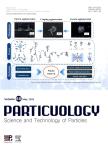Facile room-temperature coprecipitation of uniform barium chlorapatite nanoassemblies as a host photoluminescent material
Facile room-temperature coprecipitation of uniform barium chlorapatite nanoassemblies as a host photoluminescent material作者机构:Department of Chemical Engineering Qufu Normal University Shandong 273165 China
出 版 物:《Particuology》 (颗粒学报(英文版))
年 卷 期:2018年第16卷第2期
页 面:37-42页
核心收录:
学科分类:0817[工学-化学工程与技术] 08[工学] 081302[工学-建筑设计及其理论] 0805[工学-材料科学与工程(可授工学、理学学位)] 080502[工学-材料学] 0703[理学-化学] 0813[工学-建筑学] 0702[理学-物理学]
基 金:This work was supported by the National Natural Science Foundation of China (No. 21276141) and the State Key Laboratory of Chemical Engineering China (No. SKL-ChE-15A03)
主 题:Barium chlorapatite Nanoassemblies Phosphors Luminescence Room temperature coprecipitation
摘 要:As an emerging host phosphor material, barium chlorapatite (Bas(PO4)3CI), is attracting growing attention. However, rare earth-doped Bas(PO4)3CI phosphors have mainly been obtained via high temperature-based, energy-consuming techniques. In this contribution, we developed a straight- forward, facile room-temperature coprecipitation method in the presence of a specific amount of ethylenediaminetetraacetic acid disodium salt that provided Bas(PO4)3CI nanoparticles self-assembled to construct uniform Bas(PO4)3CI nanoassemblies (diameter: 80-120 nm) as well as rare earth Tb3+- doped Bas(PO4)3CI:xTb3+ nanophosphors. The nanoassemblies were transparent within the ultraviolet and visible spectral range. The Bas(PO4)3CI:xTb3+ nanophosphors exhibited four emission peaks under 228-nm excitation, and the optimal doping amount of Tb3+ was 4.0%. In contrast to traditional energy-consuming, high-temperature techniques, the facile room-temperature coprecipitation method developed here represents an attractive alternative route to obtain uniform Ba5(PO4)3CI nanoassemblies and Bas(PO4)3CI:xTb3+ nanopbosphors that are candidate luminescent hosts.



